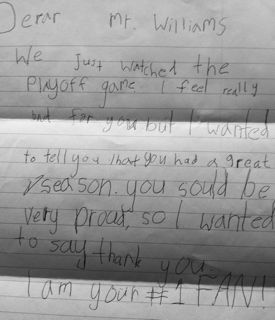Lessons from a 7-yr-old's Heartwarming Letter
 As parents, sometimes the greatest lessons come unexpectedly, and from the smallest moments. 7-year-old Owen Shure’s heart-warming letter to a football player is a perfect example.
As parents, sometimes the greatest lessons come unexpectedly, and from the smallest moments. 7-year-old Owen Shure’s heart-warming letter to a football player is a perfect example.
The Twittersphere buzzed with reactions to the San Francisco 49ers’ Kyle Williams fumbling the ball in a tight moment in the playoffs. Some responses were downright vitriolic. But hopefully Kyle also saw this touching story from Ben Mankiewicz on the Huffington Post Blog:
He was crying, saying of Kyle Williams, with the distinct sobs of a seven-year-old between each word, "But... why... did he... have to... fumble?"
 So heart-warming. And it also got me reflecting on our broader role as parents in teaching compassion to our kids. In the case of our 4-year-old son, Aum, he is not yet ready to accept compassion as a value -- but he understands pieces of it, as long as it is truly from his perspective. For example, he used to kill mosquitoes, mimicking the behavior he saw around him in the village. Trying to inculcate in him our own values of nonviolence and the sacredness of life did not get us anywhere -- even though he did understand those concepts.
So heart-warming. And it also got me reflecting on our broader role as parents in teaching compassion to our kids. In the case of our 4-year-old son, Aum, he is not yet ready to accept compassion as a value -- but he understands pieces of it, as long as it is truly from his perspective. For example, he used to kill mosquitoes, mimicking the behavior he saw around him in the village. Trying to inculcate in him our own values of nonviolence and the sacredness of life did not get us anywhere -- even though he did understand those concepts.
Then one day, I told him that if he squashed this particular small mosquito, its mom would keep looking for it and feel very sad when her child doesn't return home by night. Aum froze for a few moments. Since then, he has stopped hurting insects and even guides them to safety now, saying “Go to Mama.”
More broadly, a lot of this comes down to where we are in our own inner development. In our experience as parents, my husband and I find that we are quite far from being compassionate people ourselves, and our attempts to teach compassion to our son mostly do not work. That said, the fundamental challenge is that unless we start seeing our own practice of compassion as an absolute benefit unto itself (whether it "works" or not), it will always be a struggle.
The other common thread in both these stories is the value of asking sincere, powerful, questions that strike at the root of the matter. From author Juanita Brown:
If asking good questions is so critical,why don’t most of us spend more of our time and energy on discovering and framing them? One reason may be that much of Western culture,and North American society in particular, focuses on having the “right answer” rather than discovering the “right question.” Our educational system focuses more on memorization and rote answers than on the art of seeking new possibilities. We are rarely asked to discover compelling questions, nor are we taught why we should ask such questions in the first place. Quizzes, examinations, and aptitude tests all reinforce the value of correct answers. Is it any wonder that most of us are uncomfortable with not knowing? (The full 18-page article, 'The Art of Powerful Questions: Catalyzing Insight, Innovation, and Action', can be downloaded here)
Of course, the honest, reflective questions we ask our children stem from the ones we ask ourselves. To that end, here are some questions that we ourselves continue to consider:
* How can we teach our kids to be gentle and compassionate along with teaching them to be assertive, resolute etc (otherwise they might become misfits in a competitive world)?* What kind of life-style(s) is most conducive to practicing compassion?
* Can compassion be willed into existence or is it an outcome of one's natural empathy -- which one is more appropriate to teach to a kid and how?
* Repetition is the key to perfection. What are the daily activities that, with some subtle changes, help kids practice compassion?
* How do we teach compassion to our kids without the probable side effect of a holier-than-thou attitude?
Perhaps it is this kind of continuous reflection that attunes us to such special stories that give us a glimpse into the pure hearts of our children -- whether it is Owen’s instantaneous transition from negativity to empathy or Aum’s newfound stewardship of other living beings, they certainly keep us motivated in trying to be the change we wish to see in the world.
This article is printed here with permission from the author. Nisha Srinivasan and her husband Ragunath Padmanabhan, who share updates on natural farming and holistic living at Greenlocal.org -- their "experiment in laying a new path on an old road that leads to simplicity, sustainability and, dare we say, spirituality."
SHARE YOUR REFLECTION
3 Past Reflections


On Jan 31, 2012 Wcm3232 wrote:
We could all learn a lesson from this young man. As a coach for many years I never let my teams blame one person for a loss. There were many other plays in any ball game that is everyone had done their job correctly with error the fumble would not have made a bit of difference.

On Jan 31, 2012 Marianna Cacciatore wrote:
This was a moving story and a teaching article worth saving. Thank you!

On Jan 31, 2012 Ninelives2 wrote:
I understand and appreciate the intent of this article, however, even a 4-year old is capable of being told the truth about why to do or not to do something. That story about the mama mosquito was disgusting. Inadvertently and ultimately, parents who do that kind of stuff are teaching their kids not to trust them. And it seems to me the answers to several, if not all, of their list of questions, is to teach by example - especially when we are talking about children. Just demonstrate it. Over and over. And talk about it when those "teachable moments" are present.
Post Your Reply